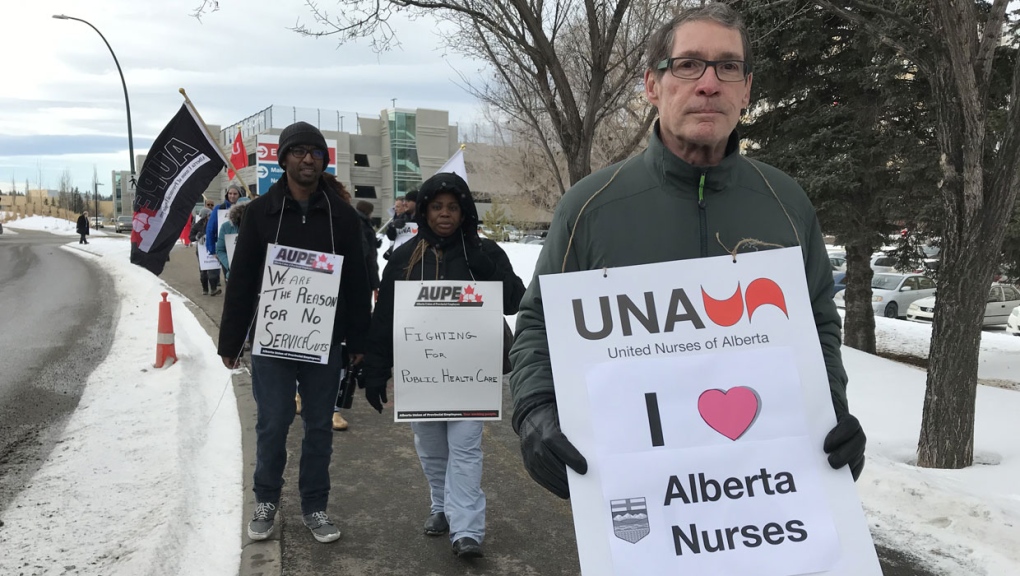Alberta nurses ratify contract that includes 4.25 per cent wage increase over 4 years
 Thousands of supporters of Alberta's health-care workers staged demonstrations throughout the province on Thursday to protest cuts by the Kenney government.
Thousands of supporters of Alberta's health-care workers staged demonstrations throughout the province on Thursday to protest cuts by the Kenney government.
Alberta's nurses have overwhelmingly ratified a new collective bargaining agreement, closing the book on what the union calls some of the most contentious and bruising negotiations in its history.
The vote was 87 per cent in favour of a four-year deal that includes a 4.25 per cent pay bump over the course of the contract.
“The bargaining committee felt strongly the mediator's recommendation issued on Dec. 21 was a fair deal that will benefit our members and also fair to the people of Alberta,” Heather Smith, president of the United Nurses of Alberta, said in a statement Thursday.
The UNA statement said the vote “brings to an end one of the most prolonged and arduous negotiations in the provincial nursing union's 44-year history.”
The contract is retroactive to 2020 and ends on March 31, 2024.
It includes a one-time lump sum payment of one per cent for 2021 in recognition of nurses' contributions during the COVID-19 pandemic.
There will be $5 million a year toward recruitment and retention strategies in rural and remote areas, and $2.5 million a year for relocation assistance.
There will also be more psychological and mental health supports for nurses and the creation of a union-employer workload advisory committee.
The deal was agreed to by 130 affected UNA locals, whose members make up the bulk of the union's 30,000 registered nurses and registered psychiatric nurses.
Premier Jason Kenney's government had been seeking a three per cent wage cut and other contract rollbacks from nurses, arguing that Alberta's nurses were paid more than those in other jurisdictions and that a tight budget required concessions.
“Alberta can no longer afford to be an outlier,” Finance Minister Travis Toews said in a statement as late as July 6, 2021.
Toews suggested at one point that nurses were putting their needs ahead of their patients' by pushing to resume collective bargaining during the pandemic.
The union, in turn, accused Toews of “grossly insulting” hypocrisy from a government that found time for collective talks with physicians and other public sector unions, but not for nurses.
It was a high-wire tightrope situation for the government, demanding wage clawbacks from nurses battling COVID-19 on the front lines while also risking the possibility of a nurses strike during a pandemic.
“Alberta Health Services' willingness to move away from its initial demands for wage cuts and to drop its efforts to impose more than 200 rollbacks made this agreement possible,” said David Harrigan, who led the UNA's bargaining committee.
Kenney told reporters that the deal respects the work of nurses while also meeting the government's goal to rein in budget spending.
“I believe that this collective bargaining agreement is a win-win,” Kenney said late Thursday.
“It ensures that Alberta nurses continue to be the best-compensated in Canada (and) at the same time it brings their compensation closer to the national average in other provinces.”
This report by The Canadian Press was first published Jan. 27, 2022.
CTVNews.ca Top Stories

B.C. tenants evicted for landlord's use after refusing large rent increase to take over neighbouring suite
Ashley Dickey and her mother rented part of the same Coquitlam duplex in three different decades under three different landlords.
Mountain guide dies after falling into a crevasse in Banff National Park
A man who fell into a crevasse while leading a backcountry ski group deep in the Canadian Rockies has died.
Expert warns of food consumption habits amid rising prices
A new survey by Dalhousie University's Agri-Food Analytics Lab asked Canadians about their food consumption habits amid rising prices.
MPP Sarah Jama asked to leave Ontario legislature for wearing keffiyeh
MPP Sarah Jama was asked to leave the Legislative Assembly of Ontario by House Speaker Ted Arnott on Thursday for wearing a keffiyeh, a garment which has been banned at Queen’s Park.
Charlie Woods, son of Tiger, shoots 81 in U.S. Open qualifier
Charlie Woods failed to advance in a U.S. Open local qualifying event Thursday, shooting a 9-over 81 at Legacy Golf & Tennis Club.
Ex-tabloid publisher testifies he scooped up possibly damaging tales to shield his old friend Trump
As Donald Trump was running for president in 2016, his old friend at the National Enquirer was scooping up potentially damaging stories about the candidate and paying out tens of thousands of dollars to keep them from the public eye.
Here's why provinces aren't following Saskatchewan's lead on the carbon tax home heating fight
After Prime Minister Justin Trudeau said the federal government would still send Canada Carbon Rebate cheques to Saskatchewan residents, despite Saskatchewan Premier Scott Moe's decision to stop collecting the carbon tax on natural gas or home heating, questions were raised about whether other provinces would follow suit. CTV News reached out across the country and here's what we found out.
Montreal actress calls Weinstein ruling 'discouraging' but not surprising
A Montreal actress, who has previously detailed incidents she had with disgraced Hollywood producer Harvey Weinstein, says a New York Court of Appeals decision overturning his 2020 rape conviction is 'discouraging' but not surprising.
Caleb Williams, Jayden Daniels and Drake Maye make it four NFL drafts with quarterbacks going 1-3
Caleb Williams is heading to the Windy City, aiming to become the franchise quarterback Chicago has sought for decades.

































